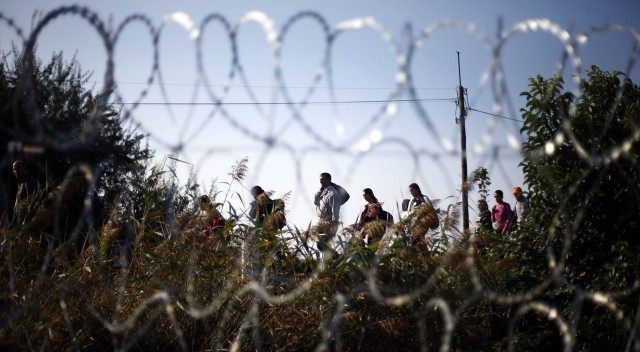As Europe’s migrant crisis reaches a head, Austria, Slovakia and the Netherlands announced their intentions Monday to join Germany and the Czech Republic in reintroducing border controls to stem the tide of migrants crossing into Europe, especially now that Germany seems unwilling to receive them.
Austria has experienced a massive influx of refugees in recent days, most of whom intended to use Austria as a bridge to Germany and northern Europe. “At the moment there are some 18,000 refugees in Austria,” says Interior Minister Johann Mikl-Leitner. At the Hungarian-Austrian border in Nickelsdorf police records currently show about 9,000 refugees.
The checks will begin “in a few hours,” Minister Mikl-Leitner said in Brussels on Monday. The government in Vienna has reacted to the reintroduction of border controls by Germany and the subsequent build-up of waiting migrants on Austrian territory.
In a joint press conference Monday, Austrian Vice Chancellor Reinhold Mitterlehner said it was necessary to pick up the signal of Germany. “When Germany introduced border controls, Austria has to do so as well.” This is also a “clear message to those concerned that there is no longer room for disorderly border crossing.”
Earlier on Monday, Dutch parliamentarian Malik Azmani said that if Europe could not find a solution, the Netherlands would have to follow Germany’s lead. “Then it becomes an every man for himself kind of Europe,” he said. According to Azmani, Belgium is also considering additional border checks.
Monday’s decision means five countries have now overridden provisions of the Schengen Agreement, which abolished internal borders and passport controls for the 26 participating states, and it seems inevitable that more nations will follow.
Until further notice, entering Germany, Austria, Slovakia, the Netherlands or the Czech Republic will require valid travel documents. On Sunday evening Czech interior minister Milan Chovanec announced that the border with Austria would be secured, and that further action could be taken depending on the development of the situation.
In Hungary, meanwhile, according to official figures there are 4,300 soldiers in the field to finish building the border fence with Serbia. As of last Tuesday, an illegal border crossing in Hungary constitutes a criminal offense punishable by imprisonment or deportation. Authorities said that on Monday morning a near-record 5,353 migrants had crossed into the country from Serbia.
No sooner had border checks at the German-Austrian border begun Sunday evening than the police arrested an Italian man allegedly attempting to smuggle eight Syrian refugees across the border in a van.
By Monday morning the number of arrests had grown to over 30 traffickers just at the Austrian border with Passau. In addition, more than 100 refugees have been taken in, according to local government spokesman, Thomas Schweikl.
The European Commission confirmed Sunday that the reintroduction of border controls by Germany was lawful, since the Schengen Agreement expressly provides for exceptional procedures for crisis situations. On Monday, however, a Commission spokeswoman said that the emergency situation had a finite life, and that Germany could leave the border controls in place for up to two months with a possible extension of two weeks, after which Germany would be in violation of the Schengen Agreement.
This is not the first time the Schengen Agreement has been temporarily suspended in Germany. Just last June Prime Minister Angela Merkel reinstated controls for the G-7 Summit held in the Bavarian Elmau Castle.
Follow Thomas D. Williams on Twitter @tdwilliamsrome

COMMENTS
Please let us know if you're having issues with commenting.